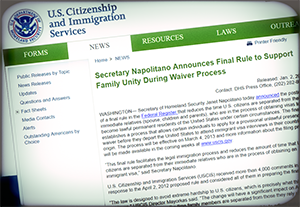In the latest installment of the Obama administration's "amnesty by executive decree" scheme, DHS has announced the creation of a new waiver that will enable an unknown number of illegal aliens who have married U.S. citizens or who have moved here illegally to join naturalized family members to avoid penalties enacted by Congress in the mid-1990s.

The so-called Provisional Unlawful Presence Waivers have been described by administration officials and the press as a measure to help families. What's wrong with that? Several things; this move is bad policy and bad principles.
Since 1996, those who have lived here illegally for more than six months are supposed to be barred from return for up to ten years, if they leave the country. Congress created a waiver to this bar if it would cause "extreme hardship" to an American citizen. In addition, illegal aliens are not allowed to adjust to green card status from within the United States. Just like other sponsored immigrants, they have to apply for a visa in their home country, where they are expected to prove identity and credibility, demonstrate that they will not be dependent on social services, get a medical clearance from an approved local doctor, and pass a basic background check.
Illegal aliens who marry U.S. citizens and other legal residents, or who have illegally joined family members with legal status, face a tough choice (that results from their original choice to violate immigration laws): either continue to live here illegally (with little chance of deportation unless you commit a crime) or return home to legalize and face a possible bar to re-entry. When applicants choose to go the legal route, if they are found by the consular officer to be otherwise eligible for the green card, about 80 percent of the time they will receive the "extreme hardship" waiver for their prior illegal presence, although it usually takes several weeks for processing. Of course, the media never discuss the people who get the waivers, but there have been a lot of sob stories about the minority of illegal alien applicants who could not demonstrate enough hardship and had to wait out the bar in their home country (or continue living here illegally).
There is some legitimate debate about whether the bar is effective in deterring illegal immigration, whether those who are related to U.S. citizens should get more of a break, and whether those who broke immigration laws should be excused from that and allowed to jump in line ahead of those who follow the rules. But Congress wrote the law, and only Congress has the authority to change it. Any change would be a compromise that tries to address all legitimate concerns.
Here are some of the other problems I see with the new waiver:
- These re-entry waivers will be granted before any government official has a chance to determine if the applicant is even eligible to actually receive a green card. Under the current system, if an applicant is found to be ineligible, whether for fraud, medical, or national security reasons, they are already out of the country, and we have one less illegal resident.
- In the name of efficiency, USCIS has set it up so that all the new waiver applications will be processed in one office here in the United States, not by those more unpredictable officers overseas, who are felt to have an inconvenient tendency to apply the law. There will be no interviews, which would enable the adjudicators to assess the applicant's credibility and claims, although USCIS says it will do a fingerprint-based automated background check to identify known terrorists and violent felons. I picture an officer in a room with a desk, a large conveyor belt with applications, and a rubber stamp that says "Approved!" Denials require the signature of several distant supervisors, and the likely forfeiture of future promotions, bonuses, parking spots, junkets, and office holiday parties.
- There is already an enormous amount of fraud in the marriage visa category, which brought in about 450,000 spouses and children in 2011, representing nearly half of total legal immigration. Most of the marriage visa fraud involves U.S. citizens, because there is no waiting list, and perhaps also because illegal aliens can qualify for a waiver of their illegal presence. This removes one more hurdle for the marriage fraudster.
- USCIS has announced that anyone denied a provisional waiver (or ultimately the green card) will be "prioritized for enforcement," which is their way of saying, "no one will try to deport them." People will be allowed to apply for the waiver as many times as necessary to gain approval.
- Those approved for provisional waivers will not be issued work or travel permits – thank goodness for small favors. However, USCIS said it will be "up to others" to decide if they can receive driver's licenses, Social Security numbers, and other benefits that would enable them to get a job or public services. We can be sure that some states will lose no time in offering benefits.
- USCIS has no idea how many people might apply for this benefit, which means it has no idea if it has the resources and staff to process them.
- For now, the provisional waivers are available only to those applying as spouses or parents of U.S. citizens. But if all goes well, by the administration's standards, next year this program will be extended to illegal aliens applying in other categories -- even though the law does not provide for such a waiver.
